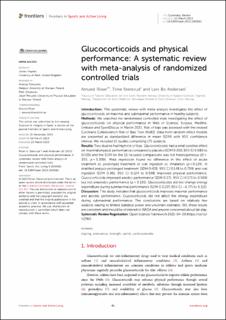| dc.contributor.author | Riiser, Amund | |
| dc.contributor.author | Stensrud, Trine | |
| dc.contributor.author | Andersen, Lars Bo | |
| dc.date.accessioned | 2023-10-12T15:10:53Z | |
| dc.date.available | 2023-10-12T15:10:53Z | |
| dc.date.created | 2023-04-27T08:15:12Z | |
| dc.date.issued | 2023 | |
| dc.identifier.citation | Frontiers in Sports and Active Living. 2023, 5, Artikkel 1108062. | en_US |
| dc.identifier.issn | 2624-9367 | |
| dc.identifier.uri | https://hdl.handle.net/11250/3096188 | |
| dc.description | This is an open-access article distributed under the terms of the Creative Commons Attribution License (CC BY). The use, distribution or reproduction in other forums is permitted, provided the original author(s) and the copyright owner(s) are credited and that the original publication in this journal is cited, in accordance with accepted academic practice. No use, distribution or reproduction is permitted which does not comply with these terms. | en_US |
| dc.description.abstract | Introduction: This systematic review with meta-analysis investigates the effect of glucocorticoids on maximal and submaximal performance in healthy subjects.
Methods: We searched for randomised controlled trials investigating the effect of glucocorticoids on physical performance in Web of Science, Scopus, Medline, Embase and SportDiscus in March 2021. Risk of bias was assessed with the revised Cochrane Collaboration Risk of Bias Tool (RoB2). Data from random effect models are presented as standardized difference in mean (SDM) with 95% confidence interval. We included 15 studies comprising 175 subjects.
Results: Two studies had high risk of bias. Glucocorticoids had a small positive effect on maximal physical performance compared to placebo (SDM 0.300, 95% CI 0.080 to 0.520) and the SDM for the 13 included comparisons was not heterogeneous (I2 = 35%, p = 0.099). Meta regression found no difference in the effect of acute treatment vs. prolonged treatment or oral ingestion vs. inhalation (p > 0.124). In stratified analysis prolonged treatment (SDM 0.428, 95% CI 0.148 to 0.709) and oral ingestion (SDM 0.361, 95% CI 0.124 to 0.598) improved physical performance. Glucocorticoids improved aerobic performance (SDM 0.371, 95% CI 0.173 to 0.569) but not anaerobic performance (p = 0.135). Glucocorticoids did not change energy expenditure during submaximal performance (SDM 0.0.225 95% CI −0.771 to 0.112).
Discussion: This study indicates that glucocorticoids improves maximal performance and aerobic performance. Glucocorticoids did not affect the energy expenditure during submaximal performance. The conclusions are based on relatively few subjects leading to limited statistical power and uncertain estimates. Still, these results are consistent and should be of interest to WADA and anyone concerned about fair play. | en_US |
| dc.language.iso | eng | en_US |
| dc.subject | corticosteroids | en_US |
| dc.subject | doping | en_US |
| dc.subject | endurance | en_US |
| dc.subject | sprint | en_US |
| dc.subject | strength | en_US |
| dc.title | Glucocorticoids and physical performance: A systematic review with meta-analysis of randomized controlled trials | en_US |
| dc.type | Peer reviewed | en_US |
| dc.type | Journal article | en_US |
| dc.description.version | publishedVersion | en_US |
| dc.rights.holder | © 2023 Riiser, Stensrud and Andersen | en_US |
| dc.source.pagenumber | 10 | en_US |
| dc.source.volume | 5 | en_US |
| dc.source.journal | Frontiers in Sports and Active Living | en_US |
| dc.identifier.doi | 10.3389/fspor.2023.1108062 | |
| dc.identifier.cristin | 2143684 | |
| dc.description.localcode | Institutt for idrettsmedisinske fag / Department of Sports Medicine | en_US |
| dc.source.articlenumber | 1108062 | en_US |
| cristin.ispublished | true | |
| cristin.fulltext | original | |
| cristin.qualitycode | 1 | |

